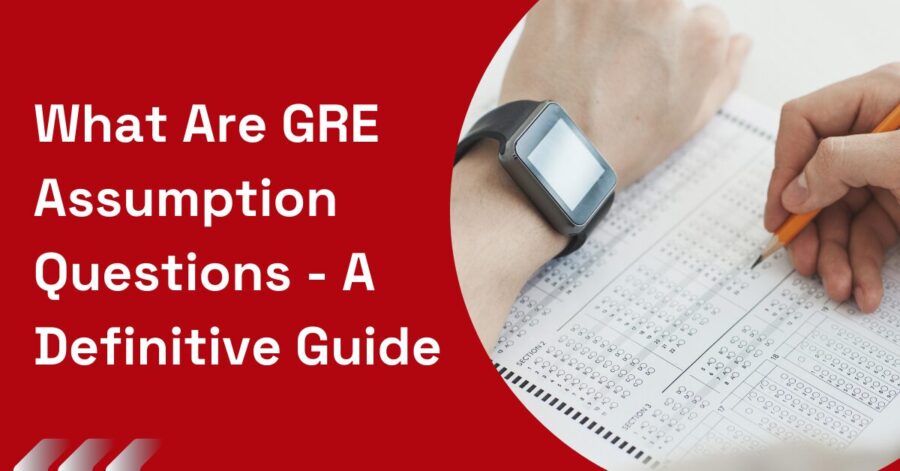17 December 2024
6 minutes read
What Are GRE Assumption Questions – A Definitive Guide

Key Takeaways
- Over 50% of GRE test-takers struggle with assumption questions, making it crucial to master this challenging section for top scores.
- Understanding the argument’s structure and applying techniques like the negation test can significantly improve your accuracy in identifying correct assumptions.
- Consistent practice with realistic scenarios and full-length tests is essential for building the confidence needed to tackle GRE assumption questions effectively.
Did you know that more than 50% of test-takers who apply to GRE find assumption questions to be among the most challenging parts of the exam? These tricky questions often leave even the best-prepared students second-guessing their answers. The struggle with assumption questions is real, especially when it feels like the test is designed to trip you up with every answer choice. If you’re aiming for top scores to secure your place in a leading business school in USA in 2024, mastering these questions is non-negotiable.
The problem with GRE assumption questions is that they require a deep understanding of the premise and how it leads to the correct answer. Many test-takers fall into the trap of selecting an answer choice that seems logical but doesn’t actually support the argument’s assumption. The key to overcoming this challenge lies in strategic GRE practice and focused test prep, which can transform your approach to assumption questions from confusion to confidence. In this guide, we’ll walk you through how to recognize and tackle these questions effectively, setting you on the right path to acing the GRE and getting one step closer to your business school goals.
What Is The GRE Assumption Question Type?
GRE Assumption questions are a staple in the GRE verbal section books, particularly within the critical reasoning section. These questions require you to identify an unstated premise that the argument depends on to be valid. The correct answer is crucial because if the assumption is not true, the argument falls apart. In other words, the assumption is the glue that holds the argument together, making it an essential concept to grasp during your GRE coaching.

When tackling these questions, it’s important to understand that the GRE test often presents arguments with gaps that the author’s conclusion relies on. For instance, a sample GRE critical reasoning question might ask you to identify an assumption that would lead to increased apartment construction if rent control were abolished. In this case, your task is to find the premise that connects abolishing rent control to a greater supply of residences, thereby reducing prices.
5 Tips To Solve GRE Assumption Questions?
Did you know that assumption questions are one of the most common types of critical reasoning questions on the GRE® test? According to test prep industry experts, mastering these questions can significantly boost your verbal section score, especially in the 27 GRE verbal percentile and beyond. The challenge lies in identifying the hidden premise that the author’s conclusion depends on, which is often tricky to spot. But with the right strategies, you can navigate these questions with confidence.
1. Understand the Argument’s Structure
Begin by carefully analyzing the premises and conclusions in the stimulus. The GRE verbal questions often include an argument where the conclusion is supported by one or more premises. Your goal is to find the assumption that bridges the gap between the two. Understanding this structure is crucial in identifying the correct answer and avoiding the trap of picking a wrong answer that may be true but does not directly support the argument.
2. Apply the Negation Test
One of the most effective techniques for tackling assumption questions is the negation test. By negating the possible answers, you can determine which option, when negated, would weaken the argument or cause it to fall apart. The correct answer is the one that, when negated, makes the argument invalid. This method is especially useful for tricky CR questions where the assumption is not directly stated.
3. Look for Circular Reasoning
Sometimes, the GRE test includes arguments with circular reasoning, where the conclusion is simply a restatement of the premise. If you spot this pattern, you’re dealing with a flawed argument, and the assumption may involve pointing out this flaw. Recognizing circular reasoning can help you eliminate incorrect answers and focus on the assumption that resolves the argument’s logical gap.
4. Consider the Broader Context
In some GRE questions, the assumption involves broader concepts not explicitly mentioned in the argument. For example, a question might suggest that abolishing rent control would lead to increased apartment construction and lower prices. The assumption here could involve the idea that removing rent control will indeed result in a greater supply of residences. Think beyond the immediate context to identify assumptions related to economic principles or social behaviors.
5. Practice with Full-Length Tests and Realistic Scenarios
The best way to master assumption questions is through consistent practice with full-length practice tests and sample GRE critical reasoning questions. By exposing yourself to a wide variety of scenarios, including those related to business or law school topics, you’ll develop a stronger intuition for spotting assumptions. As you work through these practice problems, always make sure to review your wrong answers to understand why the correct answer is correct.
5 GRE Assumption Practice Question
Practicing assumption questions is crucial for anyone looking to excel in the GRE verbal section. These questions not only help you understand the underlying logic of arguments but also prepare you to tackle similar questions in the critical reasoning section of the GRE® test. Below are six practice questions designed to sharpen your skills and boost your confidence.

Question 1: The city council is considering abolishing rent control in the downtown area to increase the number of available apartments. The assumption in this proposal is that:
- A) The increased profitability will lead to greater apartment construction.
- B) Abolishing rent control will reduce the demand for apartments.
- C) Landlords will reduce prices once rent control is removed.
- D) The current number of available apartments is sufficient to meet demand.
- E) Rent control is the only factor limiting apartment construction.
Question 2: The argument that increasing the tax on cigarettes will lead to a reduction in smoking assumes that:
- A) People who smoke will not switch to cheaper brands.
- B) The government will use the additional revenue for anti-smoking campaigns.
- C) The price elasticity of demand for cigarettes is high.
- D) Smokers are fully aware of the health risks associated with smoking.
- E) Cigarette manufacturers will not absorb the tax increase.
Question 3: A law school professor argues that abolishing tenure will lead to a greater number of competent professors being hired. This argument depends on the assumption that:
- A) The current tenure system protects incompetent professors.
- B) Competent professors are more likely to be hired without tenure.
- C) Students prefer professors who are not tenured.
- D) Tenure is the primary reason for the lack of competent professors.
- E) Tenure is a significant barrier to entry for qualified candidates.
Question 4: The claim that reducing prices for public transportation will lead to increased ridership assumes that:
- A) People are primarily deterred from using public transportation due to cost.
- B) Public transportation services will remain unchanged despite lower fares.
- C) There are no alternative transportation options available.
- D) Increased ridership will not result in overcrowding.
- E) The cost of maintaining public transportation will decrease.
Question 5: A business school professor states that offering more online courses will lead to higher enrollment in the MBA program. The professor’s argument assumes that:
- A) Students prefer online courses over in-person classes.
- B) The quality of education will remain the same in online courses.
- C) Online courses are less expensive to deliver.
- D) Other business schools are not offering online courses.
- E) The demand for traditional MBA programs is declining.
Conclusion
GRE assumption questions is not just about knowing the right techniques—it’s about developing a deeper understanding of how arguments work. These questions challenge you to think critically and see beyond what’s directly stated, which is a skill that goes far beyond the GRE.
As you continue your GRE prep, remember that consistent practice and reflection on your mistakes are key. By honing this skill, you’re not just preparing for a test—you’re building a foundation for clear, analytical thinking that will benefit you throughout your academic and professional journey.
Unlock Your Potential: Excel in GRE with Ambitio’s Expert Training! Our seasoned instructors will guide you through a personalized prep plan, optimizing your performance and boosting your confidence.
FAQs
What is the purpose of the GRE?
Is the GRE required for all graduate programs?
How much does the GRE cost?
How often can I take the GRE?
How long are GRE scores valid?
GRE scores are valid for 5 years from the test date
What is the GRE test format?

You can study at top universities worldwide!
Get expert tips and tricks to get into top universities with a free expert session.
Book Your Free 30-Minute Session Now! Book a call now




























